Lump me in with Chris Forster and Jeff Drouin, because I wanna talk about this sort of thing:
]]>Now that the last strains of vintage pan-Asian surf and garage rock are fading from our ears and most (though not all) THATCampers have made their way home, we can take a moment to express our sincere thanks.
First, to our stalwart organizing crew, who included faculty and staff from Mary Washington University, the University of Virginia, and the Thomas Jefferson Foundation (alphabetically: Joe Gilbert, Ronda Grizzle, Eric Johnson, Jeff McClurken, Patrick Murray-John, Bethany Nowviskie, and Becca Peters) — may your cardinals never lose their perukes!
We’d like to thank our sponsors: the Scholars’ Lab, SHANTI, and IATH at UVa, and Mary Washington’s Division of Teaching and Learning Technologies and Teaching Center. Thanks to the University of Virginia Library for its hospitality through the three-day event — and a big thank-you to Monticello for sponsoring our Sunday outing and behind-the-scenes, geeks-only tour.
Thanks to our wonderful BootCamp instructors: Chris Gist, Joe Gilbert, Kathy Gerber, Kelly Johnston, Nancy Kechner, Patrick Murray-John, Raf Alvarado, and Wayne Graham. Drop and give us 50!
And finally, thanks to all of YOU, who made this un-conference your own, and therefore made it great.
]]>Last night, while luxuriating in the flow of surf punk and drinks, Jarah Moesch, Josh Gorman and I were talking about how many of the best conference discussions are had with a beer at the end of the day. And then we realized that all three of us are in the DC area and we don’t need a conference to have beer and conversation. And neither do you! What we need is a regular DH happy hour.
So how ’bout it? I’m thinking bi-weekly, rotating between bars in DC, MD, and NoVA, between 7 and 9 pm, with the first scheduled in late January. Please to be voting in this Doodle Poll to pick a day of the week!
]]>Notes from the session called “Herding Cats and Modeling People” – data organization (primarily databases) and modeling information.
Websites and resources mentioned in the session:
I’m interested in a conversation about how to present the digital humanities and scholarly projects on the web and where that intersects with user centered design. Possible topics of conversation could be:
In my historical research I keep wishing there was a way that I could easily and dynamically visualize the various layers of relationship that exist within (or across) the groups of people I’m studying. In the past week I’ve made some terrific discoveries by dipping into genealogical resources, for example: three of the dozen men involved in a Revolutionary-era business venture were closely related through marriage before any of it started because A had married the widowed mother of B while C had been married to B’s wife’s sister before she died quite young, perhaps in childbirth (still tracking that down). And my interest in the business venture comes from noticing a correlation between involvement in it and in a seemingly unrelated dispute in a religious group.
I’ve looked at some genealogical software and it’s got room for lots of details, but is mostly geared toward showing trees: all someone’s ancestors or all someone’s descendants, and in that way is limited and flat. What I want to see is more like a rhizome or a social molecule or a Facebook for historians with facets, metadata, footnotes and visualization tools (and sure, GIS) built in. And it’s not just about family connections, but all manner of connections between people that may or may not end up being significant.
Though the critical impulses may be similar, this poses a different methodological problem than working with specific texts via data mining or “culturomics” or network analysis, because the bits of evidence that add up to layers of relationship are gathered from many different idiosyncratic and specific sources in a process that isn’t close to being mechanizable yet (if ever). And my interest at this point is less in displaying some final product on the open Web (though that’s surely a worthy goal as well) then in visualizing the networks so that *I*can make better sense of them, for the purposes of interpretation of historical-cultural questions.
So, if any aspect of this ethnographically-inspired historian’s digital fantasy appeals to you–how to specify it, build it, use it, improve it–I’d love to chat about it more.
]]>Following up on this tweet, I like the idea of talking about CMS as dissertation, or maybe a part of academic discourse.
One of the things that fell out of the BootCamp General Track was the idea that any website has a built-in worldview in its content model or in its data structures. I don’t have the link handy, but I think Ian Davis described another aspect on this as “code should be opinionated”.
So, I’m thinking of the case that a dissertation is an argument for an approach to understanding a domain of knowledge. And, a content management system’s organization is also an implicit argument for an approach to understanding a domain of knowledge.
Is there a practical way to link those up?
Let’s discuss!
]]>Would anyone be interested in a discussion of practical, everyday things that can be done to make websites, syllabi, Word documents, Power Point presentations, and PDFs accessible? I myself am learning how to do this, and it’s astounding how simple it can be and how few people realize it. If we can train ourselves to make very small changes in the ways we create these items, it would make an immense difference to those using screenreaders or other assistive items to access your documents. We could also experiment with the free, open source screenreader NVDA (www.nvda-project.org/).
]]>At THATCamp New England several weeks ago, I ran two non-BootCamp but BootCamp-like sessions on (essentially) turning your laptop into a basic local web development environment using XAMPP, and installing & configuring WordPress and Omeka within this environment. I have a long post in the works about this—the whys & wherefores, the process, the outcomes—but to keep this brief in this session-proposal context, I’ll simply say this…
I’m a big fan of doing my part to empower people to take control of their own applications (e.g. going with WordPress (installed) vs WordPress.com (hosted), Omeka (installed) vs Omeka.net (hosted)). Sure, it pushes some people way out of their comfort zones, but more often than not what happens is that people realize technology is not scary and not nearly as difficult to control as they might have thought. Now, I’m not saying everyone should always run their own servers and eschew hosted solutions—there’s a time and a place for all situations—but I’m also a big fan of ensuring people have a working knowledge of the things about which they’re making decisions (I also don’t like self-described “non-technical” people being pushed around by “technical” people; I like to level playing fields whenever possible).
Since this “session” was as much about explaining how web applications are put together (conceptually) and just how it is that your web browser magically displays content to you on demand, I took the time to explain a little bit about how the web works. Over the years, I’ve found that people take this process for granted; however, the only way you can really control a technology or a medium is to understand how it actually works (and then exploit that knowledge). Since DHers and related colleagues are supposedly in the business of (in part) understanding how technology intervenes in humanitistic inquiry, and how said inquiry continually shapes and reshapes technology, it stands to reason that we should all at least be able to explain the basics of web content delivery. So we started there, then talked about XAMPP (and *AMP in general), the connections between database, application platform, and content, and then put all the pieces together with installations.
In the end, 15 or 20 people walked away with shiny new development environments on their machines, but more importantly a better understanding of how the web works, especially within an application framework. So, if any of you would be interested in such a session, I’d be happy to lead it. The nature of the explanations and processes makes it less THATCamp-y and more BootCamp-y, but it’s a rollicking good time….
No prior knowledge is required—I promise.
]]>Anyone interested in a hands-on Ruby or (or other) coding session, if we promise to get it installed before tomorrow?
]]>After a morning of exhilarating workshops on GIS and GoogleEarth by the Scholar’s Lab team, and with an afternoon of more fun to go, I am left with a head full of ideas for projects that I need to be hashed out with others. So, I am proposing a session for the weekend for others to re-hash what we’ve learned, and talk out the possibilities for new projects and applications for our respective areas of research and disciplines. Since the topics of each bootcamp track are pretty different, I think that this session should be restricted to the GIS Track’s topics. Another session could cover the other BootCamp.
]]>Basically, it’s in the title: a session for relative newbies, or people who’ve been active participants in larger scale projects but are looking to set out on their own small-scale project, to brainstorm how you get from the most nebulous of ideas—”here’s a text I think I’d like to work on/present using DH tools but I don’t know if that will be worthwhile,” “I know I want to do something with maps, but I don’t know how to get started,” “text analysis seems neat, but would it actually do anything for my project”—to the actual first steps of making such a project happen.
So, in many ways, tagging along here with cedwards’s post about DIY in the digital humanities… but also wondering how to get from merely being interested to actually doing things. Vague, yes, but perhaps it would be an opportunity for some of us to hash out possibilities floating around in our heads and finding a way forward.
And I’m into the ngrams, too, and would find the Omeka/Wordpress theme sessions incredibly useful.
]]>Wow. That is a really buzz-wordy title. I had better explain myself.
As a tool builder and user I have become really interested in finding ways to improve technical documentation, particularly for the tools we as digital humanists build to do our work. Good documentation helps a project at every stage of its development. But we all hate to write (or sketch) documentation. Instead of thinking of documentation as a final chore, one more thing to do after the program works, maybe we could integrate it into the process of the developing the software. Highly commented code and up-to-date diagrams would dramatically decrease the amount of time it takes to put together a useful README file once the coding stops.
I see documentation as a chance to explain our work as digital humanists. Writing good documentation requires getting into the mindset of your users (often non-technically trained humanities scholars) and explaining what you’ve done from their point of view. As educators, this is a familiar exercise. We can teach our colleagues and students through how we explain our projects.
If we are building open source tools we will also encourage a community of users by providing them with a helpful place to find answers. There is a generosity and even warmth that comes from thoughtful, helpful documentation, just as inadequate documentation can make someone feel stupid, slighted, or unwanted as a user/developer.
I’ve created a schema visualization tool (DAVILA) to help me create better documentation for my own relational databases. If anyone else has suggestions I would love to hear them.
]]>THATCamp Open Street Map session anyone? OSM is a wiki-style map of the world that anyone can edit and it’s one of the few sources of free GIS data for many parts of our world.
This week there’s big news from the Open Street Map community as MapQuest launches their United States OSM collaboration at Open.Mapquest.com. This seems certain to attract a new crop of OSM contributors and editors to the 300,000 plus already working to crowdsource data that can be reused without restrictive copyright limitations.
Topic ideas for a THATCamp Virginia OSM discussion:
“Visible and mobile, my body is a thing among things; it is caught in the fabric of the world” –Merleau-Ponty
My body is “visible, and mobile;” it also hears, tastes, touches, interacts, and can be sedentary and blind at times. It is “a thing among things,” one object among many, “caught in fabric of the world.” To be caught is to be contained; the world is always already in motion, ready to enfold, envelope, enframe; always already producing, doing, learning, reconfiguring, erasing, removing, unbecoming; filled with potentiality and change.
The ‘fabric of the world’ invites texture and color, rhythm and weaving, resistance and movement; the haptic senses are fully incorporated in the body’s interactions within space and time.
How then can this texture, this materiality, this haptic fabric of space and our very physical bodies be rendered in a digital space? How do raced and gendered and sexualized inequities get carried over wholesale to digital spaces? What are the possibilities for an inclusive digitally embodied materiality that allows and embraces self-expression at the margins while also allowing information about bodies to be useful at meta-levels? How can this be defined at a systems level in order to create an inclusive practice for digital culture creation?
I’m interested in a discursive digitally embodied materiality- how can we think about information differently when designing databases? What current best practices might be tweaked to enable meaning at the level of personal meaning for the user, while still providing meaningful data at other levels of granularity? What standards do we take for granted, and what would the center look like if we designed for the margins?
keywords: systems, categories, classifications, standards, best practices, database design, discursive materiality, queerness, marginality
]]>Lump me in with Chris Forster and Jeff Drouin, because I wanna talk about this sort of thing:
]]>One of my responsibilities at work is managing a FileMaker relational database which captures correspondence, documents, objects, theoretical objects, individuals, institutions, keywords, and a myriad of relationship forms between them. As a result, I’ve started to think about all information which has to be organized in terms of relational databases.
We all deal with a lot of information – data – in our work. So, how do you herd your cats? Relational database, fancy app, mindmap, home-made database? Are you still using 3×5 cards (or use them in addition)? It would be fun to yak about databases, etc, (especially with Jean, who just recently released her awesome historical database), but I’m also interested in taking someone’s dataset and having everyone propose ways to organize it.
]]>This session idea comes out of the experience of working this semester, with Matt Gold, to launch the CUNY Digital Humanities Initiative. It’s a brand new group that aims to build community among CUNY DHers, and raise awareness of DH at CUNY more generally. We emphasize that all are welcome to join – “faculty, students, and technologists, experienced practitioners and beginning DHers, enthusiasts and skeptics” – and there’s been a great response so far.
With this though comes some anxiety (especially if you’re a born worrier). We built a Resource Guide to help introduce newcomers to the field, but then there’s the next set of questions: “How do I get started? What do I need to learn? How do I learn it?”
On the one hand I’m convinced that the DIY model of DH – DHer as self-motivated tinkerer – is the right one, at least for us. And since we’re funding-free we couldn’t support a more passive model anyway. But I feel responsibility too for providing new DHers (I’m one myself) with some help on the way up the learning curve. There’s a lot of work in progress on DH education but, in the meantime, what can we do to make the DIY model more practically accessible for new DHers in our group, and other groups like ours?
Very excited to see Julie Meloni on the Camper list – it would be great to get her thoughts on the best approaches, given her project to “Develop self-paced open access DH curriculum for mid-career scholars otherwise untrained.”
I’d also be very keen to pick up from Chris Forster’s post on HASTAC about this issue and its relationship to how, and how quickly, DH might develop as a field (what the Landscape of Digital Humanists might look like, if you will).
And, in hack mode, would love to hear your ideas on how can we enhance the Guide to provide or point to some better answers here.
]]>In the spring I will be teaching the second-semester, second-part to “Introduction to Digital Cultures and Creativity.” In the class, we’ll focus on creating a digital archive of letters from the Civil War (currently housed in special collections at the University of Maryland) from soup to nuts–from creating transcriptions and metadata to developing databases and designing interactive interfaces. The semester will culminate in an Omeka-powered site featuring the Civil War letters and will eventually become part of the University of Maryland Library’s permanent Fedora repository.
The program behind this class, Digital Cultures and Creativity, comprises humanities and computer science students. The class is intended to familiarize students with these technologies and to help them develop some basic skill sets they can use towards possible final projects around the archive which will include Omeka exhibits and plug-ins as well as associated multi-media projects and possibly a conceptual plan for an Omeka mobile app.
I’d like to see a session where we discuss how folks have used Omeka in the classroom. What skill sets are needed for one to feel comfortable tinkering around in Omeka and how one manages students under the hood, so to speak.
]]>Here’s a link to Raf’s part of the Intro to CMSs BootCamp session
Here’s links and images from Patrick’s parts of the Intro to CMSs BootCamp session.
UMWBlogs
UMW History Department
UMW Geography Department
Serena Epstein (freelance web design)
Lincoln at 200
Civil War Hospitals (student site)
E Belle’s Omeka Sandbox
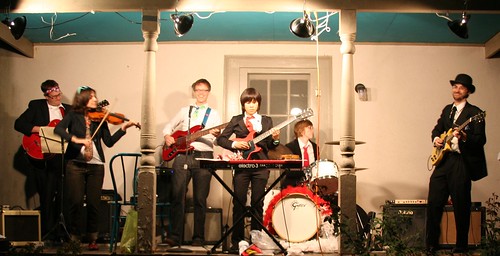
I’m excited to announce that my band Dzian! — this year’s THATCampVA house band — has prepared a Nakashi Go-Go Dance Overload for Saturday night. At 12th Street Tap House, We will play two sets of vintage pan-Asian surf and garage rock, some obscure, some among your favorites perhaps. A few numbers will feature our very Nakashi Dancers, who will be performing their own brilliant (and historically accurate) dance choreography. As the night deepens, we expect to host a go-go dance-off. If you’re curious about the format of the dance-off, check out this video, circa 1966, Japan.
Geek Bash with Dzian!
Time: 9pm – midnight or later
Location: 12th Street Tap House, 1202 W. Main Street, Charlottesville
Attire: Dress to Dance – Think 1960s
RSVP: Facebook Event
Wondering if there’s any interest in a simple, hands-on session on using/modifying/creating WordPress themes. This session might have some traction if there are enough folks attending who have ever answered “Yes” to any of these questions:
This session could cover just about anything to do with WP themes: Creating one from scratch, doing simple modifications to an existing theme, child themes, writing custom functions for themes. I’m up for doing a full-blown tutorial on how to work with WordPress themes, or we could get a group together to share how they’ve used WordPress for various projects.
]]>In the enhanced age of the digital world in which we live, it can be all too easy to congratulate ourselves as scholars for revolutionizing this or that method of mapping, organizing, surveying, or seeing writ-large. With all such bold claims, however, this often involves shutting off a large segment of the historical discourse at the foundations of our understanding of what the geospatial is, how we see it, and what it tells us about our socio-political and cultural realities. With this in mind, I’d be interested in a session in which we seek continuities between the original revolutions in the geo-spatial (the early-modern revolution of the atlas, the world map, and perspectival representation) and more recent renovations (the post-modern digitized, satellite enhanced, fragmented sense of the world as picture). I think this would allow traditional scholars and digital humanists alike to question their sense of the historical development of the geospatial as well as to seek out continuity rather than claim innovation.
Some great new readings are available on this topics from theorists working with a large historical palette right up to the present day. These could include:
–Bruno Latour’s writing on Scientific Representation: “Drawing Things Together” from Representation in Scientific Practice.
–A reconsideration of Heidegger’s “The Age of the World Picture”
–Readings from Alpers’s “The Art of Describing”
–Reading from Christian Jacob’s “The Sovereign Map”
–Readings on current practices in urban planning and cultural imagination as enhanced by Geospatial techniques.
Rather than be guided by readings, however, the session would be most ideally suited to a consideration of images of the geospatial as they become theorized and created over time, from T-O projections all the way to Google Maps, I think a tour of the cartographic and cosmographic heritage of Western thought would be a productive start to a fascinating conversation. Some questions to tackle might be:
–“Are we truly in a post-cartographic age? What kind of room for culture is there in the satellite image?”
–“What kind of evolutionary patterns can be discovered in the shifting image of the world as picture?”
–“What are the socio-political consequences as access to geospatial picture making becomes increasingly democratized? Used as the basis for both revolutions in information technology and as a major tool in the blueprinting of conventional military maneuvers and terrorist attacks alike, geospatial representation is revolutionizing the military and civilian world.”
–“What kind of continuous aesthetic concerns can be found in the geospatial?”
— And any other thoughts that might arise in confronting the vast history of geospatial representation.
]]>I’m interested in talking about classroom and class design for the future:
What should the physical space for learning include looking forward? What are our minimum expectations? Does the physical classroom matter any more? [Online and blended/hybrid classes raise complicated questions about what parts of classrooms and the things we do in them (like lecture) matter, which don’t matter, and which need to change as new virtual or physical spaces for teaching emerge, issues raised in part in Rebecca and Caroline’s proposal.] For how long and in what ways will/should the classroom change?
I’m still mulling (see my post here for one exploration of these ideas as well as this one from a colleague and this project on the spaces in which we learn), but this could well be something that goes beyond classrooms to something like “learning spaces of the future” that would combine the physical and intellectual space that classrooms, libraries, and museums occupy now and in the years to come. It might also well overlap in fruitful ways with the proposal to talk about archives in the digital world.
Anyone else interested in talking about learning spaces?
]]>The recent New York Times series on DH picked up a thread that has been fascinating me for a while:
A history of the humanities in the 20th century could be chronicled in “isms” — formalism, Freudianism, structuralism, postcolonialism — grand intellectual cathedrals from which assorted interpretations of literature, politics and culture spread.
The next big idea in language, history and the arts? Data.
Members of a new generation of digitally savvy humanists argue it is time to stop looking for inspiration in the next political or philosophical “ism” and start exploring how technology is changing our understanding of the liberal arts. This latest frontier is about method, they say, using powerful technologies and vast stores of digitized materials that previous humanities scholars did not have.
Many folks reading this will recognize here a restatement of Tom Scheindfeldt’s “Sunset for Ideology, Sunrise for Methodology” post (which I find myself constantly referencing, even if I can’t bring myself to agree with it). I’m interested in returning to this question, both in theory and in practice (as a Marxist might say), or, to adopt the argot of THATCamp, both in yacking and hacking.
First, some “practice”: we can find a particularly remarkable instance of this sort of “methodological” work in a project also profiled by the Times: Dan Cohen and Fred Gibbs’s fascinating Victorian Books project (here is Dan Cohen’s own extended write up). On a much smaller scale, with much less expertise and far less success I have played with similar techniques myself. And just yesterday Aditi Muralidharan posted about her project WordSeer, which leverages natural language processing to open richer avenues of text analysis.
Now, some yacking: Despite a lot of well-meaning “there is no practice without a theory, and no theory not put into practice” talk, this division seems pretty well entrenched (Matthew Jockers—whose work mining novels at the Stanford Literature Lab is another great example of this work—nicely tries to bring distant reading and close reading together in this recent comment). In part this is because of the very different skills (e.g. statistics!) required to make sense of (and make claims about) this new type of data. (Random Session Idea: “‘So, you never took a STATS class’, or ‘How Many is Enough?’: Statistics for Readers of Books”). It is also, I think, difficult to integrate this sort of data into the traditional concerns of humanities scholars. To use my perennial example: what can “distant reading” tell me about the history of sexuality (my metonymy for “things folks, say dissertating grad students, are interested in right now”)?
So I’m interested in putting our yack where our hack is: in trying to imagine how text analysis can contribute to the things scholars, right now, actually care about; and let’s put our hack where our yack is and play with some text and the NLTK or Voyeur or whatever. Let’s try to do something interesting.
]]>I’ve recently gotten interested in network analysis (using ORA, Gephi, and others) to support research and criticism of both large corpora and single works. So I’d be interested in a session on the use of quantitative visualization for text-based research and discovery. I’m a literature scholar and digital humanist with my feet in both the print and digital realms, with my main research areas in Joyce, modernist periodicals (with an interest in digital infrastructures like the Modernist Journals Project), and Proust. So here are some of the topics I’d be interesting in presenting on or discussing:
Aside from network analysis, I’m also intrigued by the current crisis in the humanities, with the closure of foreign language and theater departments, etc., and the responses that have come from scientists and other humanists. It would be interesting to have a discussion about the role that digital humanities plays and could play in the midst of these battles. Not sure if we need to devote a session to it, but informal discussions could be stimulating.
]]>Hi everyone,
I would love to have a session devoted to discussing some issues relevant to mobile media culture. Possible topics of interest to me include:
Those are a handful of the big ideas that I’m interested in and we can absolutely narrow it down if you are interested in discussing some of these topics. I would also be up for either creating a location-based narrative, playing some mobile games (from geocaching to Gigaputt), or going Foursquare badge hunting with any of you during the conference!
]]>I’m an ethnographer of contemporary rock music-cultures. And I love the experimental spirits among digital humanists. At THATcampVA, I would like to re-imagine the possibility of a digital ethnography. My main question is: how can digital technology facilitate field research and ethnographic ‘writing’?
Rather than texts, ethnographers’ objects of intellectual interest are social interactions and cultural practices. Anthropologists and ethnomusicologists, whose primary mode of research has been participant-observation, have conventionally privileged the traditional, non-mediated, live, and experiential over the fixed, mediated, and textual, in their field participation. In the last decade or so, they have started to see the value in studying non-physical and mediated, and oftentimes software environments, thereby extending the notion of the ‘field.’ How may digital tools facilitate the processes of observing and participating in these newly defined “fields” that are now digitally mediated? Email and engagement with social media are becoming a normative mode of interaction for many individuals in many societies. Many ethnographers use digital communication methods to find, reach, and contact their informants. In my dissertation (on the Asian American experiences of indie rock music), I spent countless hours locating musicians online, using either Google or social network sites such as Myspace, Facebook, Twitter, and Last.FM. How can we as ethnographers, besides hanging out in a chat room or on a discussion forum, take a snapshot of these digital social media interactions? What are the social, political, and institutional implications of such digital contacts, versus conventional methods of flying to a distant location and meeting someone face-to-face? Digitally mediated communication allows the user to reach far. It is a technology of horizontal expansion. What does “in-depth” fieldwork look like in the milieu where communication is often digitally mediated?
Ethnographic writing involves a set of processes distinct but related to field research. What technological extensions may further the tasks of documenting, analyzing, articulating, and representing field observations and interactions? In my dissertation, I leveraged a geo-spatial visualization tool to map the Myspace “friend” networks of the musicians in my dissertation. These visualizations enabled me see patterns of social linkage that I hadn’t anticipated. They also allowed me to generate more questions about ethnic belonging and transnational communities. So, what other digital methods could extend our capacities as ethnographic documentarians and analysts? What are the intellectual advantages (and disadvantages) of digitizing an otherwise live and non-mediated experience or interaction?
Digital humanists have developed an emerging set of sophisticated theories around the issues of texualization and archiving. To relate to these inquiries, I find that it may be useful to consider the act of ethnographic ‘writing’ as a form of textualization. So in the instance of articulating field data, we may be creating an archive of texts that interpret cultural practices. If that’s the case, my digital maps make up a cultural archive that documents and interprets the songs and performances of the musicians in my project. More flexible than conventional archive (a published journal article or book), a digital archive can be closer to life because it is akin to the performative practice of building a repertory from which agents draw scripts, meanings, and inspirations. I’m interested to hear what everyone thinks about the experimental possibility and pragmatic processes of the digital mapping of social and cultural practices. I’m also interested in exploring the notion of a digital archiving or mapping as a performative ethnographic “writing” process.
]]>(Posting on behalf of Rebecca Mitchell & Caroline Miles)
We’re both literature professors in the English department at the University of Texas-Pan American where we frequently teach fully online/reduced seat time courses; between us we have experience using Second Life, Blackboard, WebCT, Wimba, and Tegrity, to name a few technologies.
At THATCamp we’re particularly interested in reconciling two potentially clashing ideals. Neither of us believe in teaching literature primarily through lecture, and we are interested in technologies which allow us to replicate online the student collaboration and independent literary analysis that we conduct in a live classroom. At the same time, having worked to develop our familiarity with interfaces and software, we are now really interested in learning about other ways to build content online, not just enhancing the mode of delivery.
We are curious about ways in which technologies relate to content outside of the classroom, and curious to learn how others ensure that content remains the focus in an online learning environment without depending on posting lecture notes/recorded lectures or turgid learning modules.
]]>Kind of following on the tracks of those who are interested in the marriage between the material and the digital, I want to talk about the ways in which we can use web standards to create the best digital variorum edition of a given work. I’m working with two sets of problems: The first is how to represent manuscripts and print editions as close as possible to the originals. I’m thinking of creating a tighter connection between CSS and TEI (ex. linking @rend to HTML representations), using XSLT to generate the stylesheet. The goal is to try to capture as much of the original bibliographical codes (non-textual elements like page layout, font, etc), whether these are determinant (as in experimental modernist texts) or not. The second goal is to visualize change over time in a compelling way. We have several tools that do this already, but I want to do this using well-represented texts. Perhaps do a Juxta-like comparison that takes into consideration the bibliographical codes. Originally Juxta was conceived as an analytical tool, but recent developments are transforming it into a representational-tool. Perhaps one of the conversations we can have is how DIFF software can use the TEI-CSS relationships I’m trying to build to make comparisons resemble having two paper versions side by side.
]]>A couple of the things I’d be interested in talking to other THATCampers about are loosely tied together. First, as a digital librarian at a state school in a historically very underfunded state, I’m interested in ways of reaching out to smaller libraries, historical societies, and museums and helping them expose their collections online. Since many lack the technical skills and manpower to do extensive digitization projects, I’ve been brainstorming what might be the best way to do a one or two day workshop that gives them a simple package of tools and expertise to digitize parts of their collection, while still adhering as closely as possible to best practices. I know similar workshops have been offered by other libraries and I’ll be looking to those offerings for models. The development of Omeka.net is also looking very promising as a tool with a low barrier to entry, and I’d be interested in talking to anyone who’s worked with it (I have experience with the standalone Omeka, but not the hosted version) or has experience in working with small cultural heritage institutions.
I’m also starting to think about what sorts of content we’ll have in the archives and special collections of the future, especially when it comes to digital content. I find it interesting that a lot of the “collecting” being done now is happening outside the structure of libraries, museums, or academia. (Although this does seem similar to the way that ephemera and/or popular culture items have been collected in the past.) I can easily visualize future research that could make extensive use of comprehensive collections of modern language and practices like UrbanDictionary.com or KnowYourMeme.com. So what is the role of libraries as “private” or for-profit sites like these eventually go out of business?
]]>“User demand for digitized collections [from Special Collections] remains insatiable.”
—Taking Our Pulse: The OCLC Research Survey of Special Collections and Archives
Actually our reading rooms aren’t empty; they are bursting at the seams. Special collections’ and archives’ use statistics zoom up each year. In fact, we set an all time record for research visits, research hours, and circulation in October at MARBL. And yet . . . I can’t shake the nagging feeling that special collections libraries have been bypassed – left behind – because our access model is obsolete. The age of the internet, mobile devices, social media, e-readers and the insatiable demand for digitized collections has laid bare for all to see that our ‘consulting-manuscripts-and-rare-books-in-a-staid-and-rarified-reading-room’ model is nothing but a late 19th century genteel tradition that is desperately in need of modification. So what now? We have content – lots and lots of rare and unique content relevant to the humanities – but how are special collections going to deliver it? I’d love to hear thoughts, advice or even rants about this because, after all, we have nothing to lose but our 19th century chains.
]]>I’m interested in any and all intersections of the material and the digital. I wonder if this broader category could serve as an umbrella under which to talk about the sorts of things that Bethany proposes as well. This is a new area for me, but I’m particularly interested in how digital networks might influence craft, and especially traditional crafts. So, really, I would be thrilled with any sessions that deal with the intersection of the digital and the material, particularly if we are thinking especially in terms of material production. How does a digital interface or digitally facilitated set of relationships influence what an artist or craftsman actually produces?
]]>Through my own research on the CIA and its “sister-agencies,” I’m getting the anecdotal impression that there are some discourse communities in which expertise can actually be a liability. I’d be curious if others, working in any, any other areas, have noticed or suspect similar trends/liabilities. I’m speculating based on my own anecdotal impressions that this issue rears up most frequently and most problematically when experts interact with non-experts. This idea is really germinal in my brain, so I’d simply be interested in batting the idea around, hearing if others have encountered similar phenomena, and if others have noticed it, speculating a bit as to what might be behind such a notion. In this way, I and others interested in the issues might be able to set a research agenda. If others think this problem does exist, I’d be interested in speculating/strategizing further about how the digital humanities, broadly conceived, might address the problem. Is this problem, if it exists, part of a larger ethical failure, and what is the role of ethics in the digital humanities, or the role of the digital humanities in ethics?
]]>I recently relocated from an institution where tons of people were working in my subfield to one where I’m the only person working in my subfield. This shift has made the process of getting feedback on in-progress writing considerably more difficult, since I don’t have the benefit of a critical mass of colleagues working in the same area and all of the interactions that stem from such critical mass. But, of course, I know lots of people nationally whose feedback I would love to receive, and who are willing to offer it.
Following on a recent reading of Colin Gifford Brooke’s Lingua Fracta, I’ve been thinking a lot about digital interfaces. In the past, commenting on writing via email has been cumbersome and confusing when it involves more than two or three people. And I don’t think blogs are less cumbersome.
As a possible solution to both the feedback and interface problems, I’ve been thinking about sports brackets as a way to organize writing feedback, and specifically about building a Drupal installation to bring the idea to fruition. The process might work like this. Let’s assume the 8 scholars want to join forces and share their in-progress writing. My idea is that the writing in need of the greatest revisions/rethinking should get the most attention. The bracket is an effort to systematize that thought. First, the scholars would be ranked, 1 through 8, the same way that basketball teams or wrestlers are seeded in tournaments. The scholars/writers would be ranked according to experience, number 1 the most experienced scholar, and number 8 the least experienced. Then the scholars would be paired the same way they are in sports tournaments:
1 and 8
2 and 7
3 and 6
4 and 5
At this point, I really, really want to jettison any metaphors of winning or losing. The paired scholars would exchange writing, and after providing feedback, by mutual agreement would agree which piece of writing needs the most additional work/input from additional writers. The person and their piece of writing would move forward in the bracket. [I have no good way of visualizing this in WordPress, so here’s a link to .pdf of a typical 8 person double elimination bracket, for visualization purposes.]
Let’s assume that in the first round of reading that in every case the least experienced writers’ work is the one that is in the roughest shape and the most in need of additional feedback. That work continues through the bracket. The next round of pairings would look like this:
8 and 7
6 and 5
The less experienced writers/scholars are now giving each other feedback, and it continues for another round with, say, 8 and 6 paired. So, as one progresses through the system, presumably making revisions after each round of feedback, the least experienced writers/scholars receive the most feedback and experience reading others’ work.
What’s in it for the experienced scholars? Well, they could drop into a “consolation” bracket and get feedback from each other. For example, the 1 and 2 we “eliminated” in the first round then exchange works, etc, etc
I think all of this could be systematized in Drupal in ways that would make the exchange of writing and feedback extremely easy. I could explain this so much better with a marker and dry erase board . . . Just an idea. Sorry I nipped over 500 words . . .
]]>A topic I’m interested in examining is Digital Archaeology. I’m not sure if there are any archaeologists besides me in attendance (a shame if it’s the case, considering how much amazing archaeology there is in the Chesapeake), but I think there is a fantastic discussion to be had about what is being done and what can be done in digital archaeology. At this point, digital archaeology has emerged in three areas: Field Technology/Methodology, Research Databases, and Public Engagement.
Field Technology has always been a field that has adopted technologies from other fields and applied them to archaeological methods. GIS and advanced survey equipment have been the major technological adaptions, but the recent use of the iPad in Pompeii opens the door for (finally) people to conduct paperless excavations.
A number of digital research databases have emerged, including the Comparative Archaeological Study of Colonial Chesapeake Culture and the Digital Archaeological Archives of Comparative Slavery (DAACS), housed at Monticello. These databases allow researchers to easily access numerous reports and data sets about archaeological sites, making comparative analysis that would have otherwise been expensive and time consuming a much more affordable venture.
Public Engagement has been the most evident use of the digital environment. Archaeology has a long tradition of “public archaeology”, and new technology provides us with a number of alternatives to how we conduct our operations. Most popular are the digital reconstructions of towns and buildings such as at Colonial Williamsburg, where they are in the process of recreating the entire colonial city as it was in 1776. Such a venture is heavily reliant on archaeological research conducted at the museum. At Monticello, there is a fantastic digital representation of the entire plantation, highlighting the archaeological projects conducted throughout. Also, my work with the MSU Campus Archaeology Program has used digital social media as a means of engaging the public in learning about the process of archaeology, and to make discoveries along with us in the field. You can read a bit more about my work here (The use of digital media and digital technologies to engage community in the process of our work is a separate topic. I can write more if there’s interest. Post a comment below!).
So, my questions are this: What are some of the challenges faced by archaeologists with these emerging technologies? How do we train students to use and engage with these technologies? How do we present them as useful things worth investing in to our colleagues/advisors/administrators? How do these technologies change the way we operate when collecting data? Do we need to change the way we think about collecting data so that it is more appropriately geared towards new technologies? What types of data would be useful for non-archaeologists, such as museum professionals, to be able to use in the public engagement portion of our discipline? What are some other new technologies that could fit into these categories, or what are some other categories of archaeology that could be added to the picture?
These are some of the things I’m thinking about…feel free to add on below!
]]>THATCampVA formally wraps up after lunch on Sunday, Dec. 19, but that won’t stop us from keeping the fun train rolling!
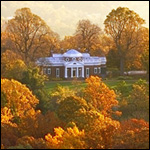 The good people at Thomas Jefferson’s historic home, Monticello, have invited interested THATCampers to be their guests for a special (free!) tour of the house, including a VIP trip to the legendary Dome Room. Thomas Jefferson would so have wanted to go to THATCampVA–technophile, researcher, and inveterate tinkerer that he was.
The good people at Thomas Jefferson’s historic home, Monticello, have invited interested THATCampers to be their guests for a special (free!) tour of the house, including a VIP trip to the legendary Dome Room. Thomas Jefferson would so have wanted to go to THATCampVA–technophile, researcher, and inveterate tinkerer that he was.
To get a sense of the schedule: the tour is timed so we can enjoy our closing lunch before we wind our way to Monticello. Attendees should aim to arrive at the Visitor Center at around 2:00 in order to catch the shuttle to the mountaintop. Our two tour slots are at 2:40 and 2:50 and are limited to about twenty people each. The house tour plus Dome Room should take a little under an hour. Then we’re free to enjoy the grounds or wander the exhibitions or head home with heads spinning from all the THATCamp-aliciousness.
Specific details will be covered at THATCampVA once we’re all together. However, it would be helpful to get an early sense of how many people are interested in going on this tour, so that Monticello can adjust to numbers if needed. Please drop Eric Johnson a line either @edmj or at ejohnson [at] monticello [dot] org to indicate your interest in joining us.
Can’t wait!
]]>While user-generated content (UGC) has been around for a long time in museums–the mid-19th century Smithsonian, for instance, asked amateur collectors to send in natural history specimens from across the country–the digital world has lowered barriers and made it easier for users to participate in the creation of knowledge at cultural heritage institutions. Recent examples include the oral history project StoryCorps, the Hurricane Digital Memory Bank, or the Transcribe Bentham crowdsourcing project.
Much has been made about how the growth of UGC affects the nature of authority and radical trust. But there are still more fundamental questions to tackle. The ones that interest me now are about how we look at UGC projects in the first place.
I’d love to talk to others who want to explore the whole idea of UGC-oriented, crowdsourced, “citizen humanities” projects, especially by analogy to citizen science projects like the venerable SETI@home or Cornell’s eBird project. Similar conversations have taken place at THATCamp MCN and THATCamp Columbus.
I have a particular interest in developing a vocabulary related to (or better yet, a taxonomy of) UGC projects. This would help us to better describe–for users, for funders, for everybody–what these UGC projects are, what they intend to do, and how to evaluate the success of such projects.
But even more than that, I want to hear from other folks. Let’s take a look at a bunch of citizen humanities and citizen science projects and see what they can tell us.
]]>Following the effort to make these posts quick and happy to read, (and my tendency toward informality and throwing up ideas to see what sticks), here’s my rundown of things I’m happy talking about with interested folks at THATCampVA — in 500 words or fewer!
One fun recent event I was part of was One Week | One Tool, a big experiment in whether twelve digital humanists can get together and build a new DH tool in one week. Answer: Yes. But the alternative approach and process to creating a project might be an interesting thing to talk about and think about how it could offer ideas for getting other projects off the ground.
The tool we built is Anthologize, a WP plugin to publish site content in other formats, like PDF or ePub. Happy to share ideas about how it could be used for various DH sites and projects, too. Especially interested to talk about different output formats and themes, and if/how they might be useful.
More generally, I’m always up for talking about semantic web and linked data, and about coding for the humanities.
So, we’ll see if interest starts to coalesce around any of those!
]]>I suppose I’m a tactile tinkerer. When I have time for it, I tinker a bit with wearable computing — also called “soft circuits,” “embodied interaction,” or — arguably — augmented reality. This is the (often gendered) art or craft of sewing electronic circuitry, sensors, and microprocessors like the Lilypad Arduino into clothing, jewelry, toys, and other household goods so that they become (or make you become) aware of their/your environment in new ways.

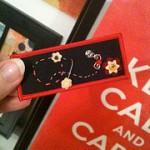
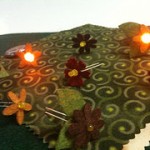
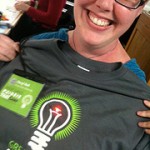
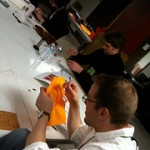
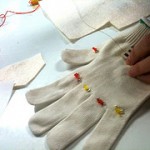
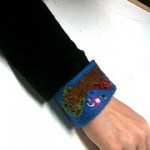
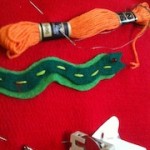
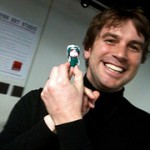
Bill Turkel and I taught a workshop on hacking wearables and e-textiles at THATCamp Great Lakes, we had fun with this stuff at the #pastplay symposium, and I gave away freebies at the last THATCamp Prime.
But here’s my question for THATCampVA — which I’ve also posted to @DHanswers:
Conceptually, I can’t get past toys and art pieces — like blinky, light-up merit badges, ambient orbs that respond to the state of my inbox, a tipsyflower brooch made of shape-memory wire & breathalyzer parts, jewelry that whines when you walk north…
I’d like to design a project that I felt was meaningful in terms of digital humanities theory or research — something useful within, or reflective about, the field. And I’m just stuck. Any ideas?
One thing I love about the LilyPad Arduino community is Leah Buechley’s emphasis on soft circuits as a path to teaching young girls to hack things and code. I guess what I’m looking for (and maybe will have to write) is a similar approach to wearable computing and embodied interaction for serious (eh, semi-serious) DH.
I’ll bring my bag of silvery, conductive thread and blinky self-meriting merit badges (a fun first project) to THATCampVA for anybody who’s interested — but what I’m really bringing is this question:
Can we collectively imagine and engineer a meaningful set of projects, or an R&D agenda, for embodied interaction in the digital humanities?
]]>Welcome, everybody! Coming very soon to the THATCampVA site are user accounts and a page of camper bios. (You people are amazing — we can’t wait to get you all in one room!)
Your local organizing team have decided to set a good example for session-proposal posts by writing a few to get started. The main thing we’re doing differently from other THATCamps in this regard is encouraging you to limit your posts to approximately 500 words. We’ve noticed, at other camps, that the preparatory reading and writing is getting overwhelming — and we firmly believe that an exciting and thoughtful proposal can be made with great economy. (Besides, observe how Bethany is about to cheat by linking to things she’s written elsewhere, for people interested in more detail.)
Onward!
]]>Just a last reminder, that the deadline to apply to THATCamp Virginia is TONIGHT, October 25th, at midnight EST.
On to the extras! We’re excited to announce that, in addition to our rich BootCamp program and Saturday-night outing to hear North America’s premier Nakashi surf rock band, Dzian!, we are arranging a Sunday expedition and special tour of Thomas Jefferson’s amazing home, Monticello!
Many thanks to our co-sponsors on the little mountain. And stay tuned for details!
]]>Applications are now open for approximately 60 slots at THATCampVA!
DUE DATE: October 25th
Selected attendees will be notified by early November.
A limited number of fellowships, meant to defray costs of travel and lodging, are available for qualified THATCampers who plan to attend our BootCamp sessions. Determine your eligibility for a BootCamp fellowship at the link above, and apply separately.
]]>We’re proud to announce the schedule for THATCampVA’s BootCamp, to be held Friday, December 17 in the Scholars’ Lab. The BootCamp will be composed of two tracks: a GIS Track featuring sessions lifted from the SLab’s NEH-funded Geospatial Institute and a General Track with introductions to a variety of tools and approaches to Web development, statistics, and qualitative analysis.
Interested in attending the BootCamp? Be sure to let us know when you apply for THATCampVA. Tuition is free, but a handful of fellowships are available to defray travel costs for qualified applicants.
| GIS Track Alderman Electronic Classroom |
General Track Scholars’ Lab Classroom |
|
|---|---|---|
| 8am – 9am | Breakfast (Scholars’ Lab) | |
| 10am – 11am | Making Your First Map Chris Gist & Kelly Johnston |
Web Building Blocks Joe Gilbert |
| 11am – Noon | Virtual Globes Chris Gist & Kelly Johnston |
Programming with Ruby Wayne Graham |
| Noon – 1pm | Lunch (Scholars’ Lab) | |
| 1pm – 2pm | Working with Historic Maps Chris Gist & Kelly Johnston |
Statistical Analysis with R Kathy Gerber |
| 2pm – 3pm | Introduction to Web Mapping Joe Gilbert |
Qualitative Analysis with N’Vivo Nancy Kechner |
| 3pm – 4pm | GIS Playtime Chris Gist & Kelly Johnston |
Intro to CMSes: WordPress, Drupal, Omeka Rafael Alvarado & Patrick Murray-John |
Hey, campers! We’ll open up this site to THATCamp applicants and announce our exciting BootCamp program later this week — including two tracks: one offering a super-condensed version of the training program from the Scholars’ Lab’s NEH Institute for Enabling Geospatial Scholarship, and the other on programming, web design, and content management skills for humanists! BootCamp will be held the day before THATCampVA starts. Tuition is free while spaces last, but you may be eligible for fellowship funding to defray travel expenses!
But, whatever. Here’s the big news: on Saturday night, December 18th, Dzian!, an international surf-garage rock band with a sizable local following, will play a special show for THATCampVA and friends at the 12th Street Tap House. Dzian! plays a selection of 1960s-70s dance pop and garage/surf rock from the entire continent of Asia. They perform semi-regularly with their own gogo dancers, The Nakashi Dancers, and have lately started a collaboration with Fire in the Belly, a local belly dance group. Best of all? Dzian! is led by digital humanists: Scholars’ Lab denizens and fellows, UVa music grad students and recent PhDs. Dzian! (That means “super-cool!”)
]]>Just a quick update to say: look at our lovely new site! Many thanks to Regional THATCamp coordinator Amanda French and CHNM‘s Creative Lead, Jeremy Boggs, for the work they are doing on a “THATCamp-in-a-box” infrastructure to support events like ours — and to Joe Gilbert of the Scholars’ Lab for his efforts, too. Finally, thanks to Eric Johnson of Thomas Jefferson’s Monticello, for our periwigged, puffed-up, dare-I-say prestigiously presidential logo. If a cardinal in a peruke doesn’t scream “Central Virginia” we don’t know what does.
Local organizers are hard at work on the arrangements for December — including our planned BootCamp sessions the day before THATCamp begins. We hope to be opening this site up to applicants by October 8th, so stay tuned!
]]>We’re excited to announce THATCampVA!
What?
You know! a regional THATCamp.
When?
A BootCamp (heavy on technologies for studying space and place) will be held on Friday, December 17th; then…
THATCampVA will be held on Saturday and Sunday, December 18th and 19th, 2010.
Where?
Charlottesville, Virginia (at UVA Library’s Scholars’ Lab)
Who?
Organizers include digital humanities folks from UVA, Mary Washington, Monticello, and other central Virginia institutions
— but this is your unconference!
Anybody with energy and an interest in the humanities and/or technology should attend.
We’ll start accepting proposals on this site in early October — and only have slots for 50-60 attendees! Participants will be notified of acceptance in November. Questions in the meantime? Email us!
Look here for more news soon — and follow us at @THATCampVA.
]]>